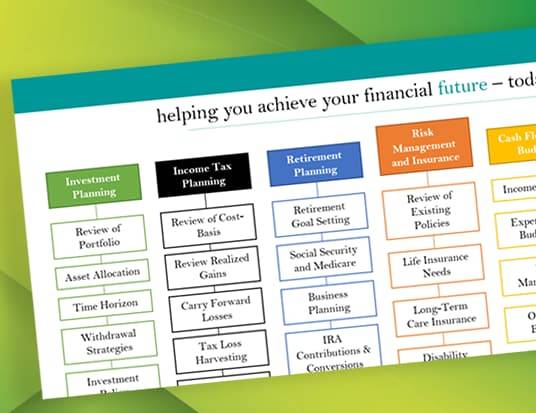
I hope you get value out of this blog post.

When financial advisors try to “justify” their fees, the first thing many turn to is portfolio returns. On the surface, it makes sense. “If you pay me this fee, I’ll help you get this much back in the form of improved returns.” However, portfolio returns are just one narrow dimension of the value you provide. Focusing only on that one narrow dimension obscures all that other value.
More importantly, it doesn’t provide a full picture of what your client might actually need. In reality, your clients also need your help with managing risk, making their portfolio more tax efficient, more cost efficient—and all that’s not even touching on the financial planning services you can offer outside of a client’s investment portfolio.
So how do you talk about the value you provide in exchange for your fees without limiting yourself to your ability to maximize returns? One way to do it is to reframe the conversation as one about financial goals instead.
For every argument in favor of a financial advisor’s ability to improve a portfolio’s returns, you’re going to see a dozen naysayers out there who will tell you that investors can maximize returns on their own without paying an advisor to do it for them.
Whether or not an investor could do it on their own, the likelihood that they would do it in the most cost-efficient, tax-efficient, and low risk way possible is small.
Moreover, the need to choose the right financial products to fit their investment goals or to shift the balance of their portfolio over time as their priorities change all make the DIY approach complicated. If the investor also has a full-time job and a family, there simply isn’t enough time to do it all on their own, without missing some details.
This is why financial advisors need to change the conversation. The reality is that you’re providing a multidimensional service that goes way beyond returns. But, when you only talk about returns, any DIY investor with a reasonable understanding of the market will feel like they can do what you do on their own.
If you shouldn’t fixate on portfolio returns, what should you talk about with your clients? The short answer: talk about their financial goals. Then, frame your value conversation in terms of those specific goals.
In some cases, returns might be a feature of that conversation. In most cases, the conversation will revolve around a variety of other services and skills. Here are some things that you might talk about instead:
Investors might have a general sense of what kind of goals they’re interested in. Some might be working on a college fund for their kids. Others will want to retire comfortably. Still others will want to minimize tax exposure or figure out how best to manage an inheritance.
However, without financial expertise, these goals end up being vague and uncertain. Moreover, it’s rarely clear what the specific steps from point A to point B are. How much does this person need to retire “comfortably” by their standards? When do they want to retire? How much will they need to invest throughout their working life in order to get to that amount? What is the best allocation of assets to achieve that number on time at the lowest possible risk?
Without appropriate and manageable goals, investors are just throwing money into investments without knowing how much they need or whether they’re doing enough to get there.
A financial advisor can help transform those vague goals into attainable targets, complete with a concrete action plan.
The best investment policy is the one that you adhere to, without fail, all the time. One of the biggest mistakes DIY investors make is coming up with a strategy but then going rogue when it comes to actually implementing it. They’ll sell off shares in a panic or hold onto a stock far longer than they should have, in hopes that’ll recover or become even more profitable.
When investors go off script like this, they can seriously impact their returns and end up blaming the strategy as being faulty. In reality, it’s the investment turnover and bag holding that are eating away at their returns.
Advisors can help investors draft a clear investment policy statement that meets their specific goals and then help them adhere to that policy fully and consistently for the long term.

As markets shift from bullish to bearish or investors shift their priorities with time, portfolios will need tweaking and rebalancing. A more aggressive growth portfolio might need to be gradually transformed into a conservative, risk-managed portfolio as the investor seeks to secure the gains accumulated through the high growth years.
As markets turn bearish, some hedging and insurance strategies might be helpful, especially for retired clients or those who will need to start withdrawing from their portfolio soon.
This kind of tactical adjustment requires a level of expertise about which assets and financial products are most appropriate for which stages of life as well as what the best strategies for responding to the current market are.
On the other side of the returns coin, you have taxation and costs associated with an investor’s portfolio. Most investors tend to focus on maximizing returns and give only passing consideration to the costs of each investment, especially where ETFs are concerned.
Financial advisors, on the other hand, have an in-depth understanding of how to keep the costs of investments down by choosing the lowest-cost ETFs and keeping transactions to a strategic minimum, but also how to protect those returns from taxation effectively.
Without considering the tax efficiency or cost of a portfolio, those taxes and fees can eat into the returns they’re getting.
The key takeaway here is that too much focus on “maximizing returns” really doesn’t do justice to the full scope of the value you provide as a financial advisor. Without talking about the full range of value, clients can lose sight of just how much they’re getting in exchange for that financial advisor fee.
For more tips and insights into how to reframe your conversation with clients, check out my in-depth post on the value of financial advisors!
